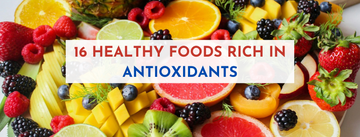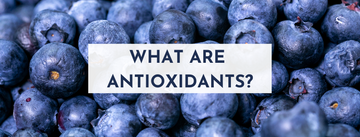Many healthy foods are packed with antioxidants, like berries, nuts, and veggies. They not only help fight off harmful substances called free radicals but also come with other health perks, like lowering the risk of chronic diseases.

Source: Many foods like berries, chocolate, beans etc. are high in different antioxidants
Antioxidants are natural compounds produced by the body and found in food. They work to protect cells from damage caused by free radicals, which can lead to oxidative stress and up the odds of getting chronic diseases.
Having a diet full of antioxidant-rich foods boosts the levels of antioxidants in your blood, lowering oxidative stress and the risk of diseases. Here are 16 top healthy foods high in antioxidants.
Antioxidant-Rich Foods to Include in Your Daily Diet
Many of the best foods are rich in antioxidants. By incorporating these foods into your regular diet, you can elevate your antioxidant levels, potentially shielding your body from the harm associated with oxidative stress.
Below, we highlight 16 of the healthiest foods that can help you increase your antioxidant intake.
1. Dark Chocolate
For those who adore chocolate, here's some good news: dark chocolate isn't just delicious—it's also nutritious! Unlike regular chocolate, dark chocolate contains higher amounts of cocoa, along with more minerals and antioxidants.

Source: The best dark chocolate bars are packed with antioxidants, are low in sugar, and crush cravings.
Additionally, the antioxidants found in cocoa and dark chocolate are associated with remarkable health advantages, including decreased inflammation and lower risk factors for heart disease.
2. Blueberries
Despite their low calorie count, blueberries are bursting with nutrients and antioxidants.
Studies conducted in test tubes and animals suggest that the antioxidants in blueberries can slow down age-related cognitive decline by combating harmful free radicals, decreasing inflammation, and influencing the activity of specific genes.
Furthermore, the antioxidants in blueberries, particularly anthocyanins, have demonstrated effectiveness in reducing risk factors associated with heart disease. They can also help lower levels of LDL cholesterol and blood pressure.
3. Pecans
Pecans, a type of nut native to North America, are rich in healthy fats and minerals. They also boast a high antioxidant content.
Eating pecans can increase antioxidant levels in the bloodstream and potentially lower cholesterol, a known risk factor for heart disease.
However, it's worth noting that pecans are calorie-dense, so it's essential to watch your portion sizes, especially if you're aiming to shed some pounds.
4. Artichokes
Artichokes are packed with nutrients and antioxidants, making them a valuable addition to your diet. Studies suggest that they may help lower cholesterol levels and promote gut health.
Research on the medicinal properties of artichokes has indicated their potential benefits for gut, liver, and heart health.

Source: Artichokes are rich in fiber, antioxidants, and other nutrients.
A study comparing boiling, frying, and steaming found that steaming increased antioxidant effectiveness by 15 times while boiling increased it eightfold.
This increase is attributed to the breakdown of cell walls during cooking, which makes the antioxidants more accessible.
5. Strawberries
Strawberries are not only sweet and versatile but also packed with vitamin C. Their vibrant red color comes from anthocyanin, a powerful antioxidant abundantly found in them.
Studies indicate that anthocyanins in strawberries may contribute to lowering the risk of heart disease by decreasing LDL (bad) cholesterol levels while increasing HDL (good) cholesterol levels.
6. Goji berries
Goji berries are often hailed as a superfood due to their high content of vitamins and minerals.
These berries also boast unique antioxidants called Lycium barbarum polysaccharides, which have been associated with a lower risk of heart disease and cancer.
However, incorporating goji berries into your diet regularly may be costly.
Additionally, while there is some research supporting their health benefits, studies on humans are limited. More research on their effects in humans is necessary to fully understand their potential benefits.
7. Red cabbage
Red cabbage is packed with nutrients, including vitamins A, C, and K, as well as various antioxidants.
Similar to strawberries and red kale, red cabbage contains anthocyanins, a type of antioxidant responsible for its vibrant red color. Anthocyanins offer numerous health benefits, including supporting heart health, preventing cancer, and reducing inflammation.
Research suggests that anthocyanins may also have the following health benefits:
- Anti-inflammatory properties
- Anti-cancer effects
- Aid in managing diabetes
- Support weight control
- Help prevent heart disease
Despite these promising findings, more research is needed to fully understand the health effects of consuming red cabbage. Red cabbage can be enjoyed raw in salads or cooked as a flavorful vegetable dish.
8. Raspberries
Raspberries are rich in dietary fiber, vitamin C, and manganese, making them a nutritious addition to your diet.
Studies suggest that the anti-inflammatory and antioxidant properties of black raspberries may help slow down and suppress the effects of various cancers, based on a review of five studies.
The antioxidants found in raspberries, particularly anthocyanins, are believed to lower inflammation and oxidative stress, potentially reducing the risk of heart disease.
However, most of the evidence supporting the health benefits of raspberries comes from studies conducted in test tubes. Further research focusing on humans is necessary to fully understand their impact on health.
9. Beans
Beans, including pinto beans, are rich in protein and dietary fiber, making them a nutritious choice for any meal.
Research suggests that pinto beans may contain compounds, like kaempferol, which could help suppress the growth of certain cancers and reduce inflammation. Kaempferol, a plant flavonoid found in pinto beans, has been linked to the suppression of cancers such as breast, kidney, lung, and bladder cancers.

Source: Pinto beans are related to kidney beans.
Although studies have shown promising results in animals and test tubes, more research is needed to understand how kaempferol affects antioxidant activity in humans.
Regardless, incorporating beans into your diet can offer numerous health benefits, making them a valuable addition to your meals.
10. Kale
Kale stands out as one of the most nutritious greens available, packed with essential nutrients like calcium, and vitamins A, K, and C. Notably, it's also abundant in antioxidants.
Red varieties of kale, in particular, boast higher levels of anthocyanin antioxidants, along with various other antioxidants responsible for their vibrant coloration.
11. Beets
Beets, also referred to as beetroot, offer a wealth of nutrients, including fiber, potassium, iron, folate, and antioxidants.
They are especially abundant in a type of antioxidants known as betalains, which lend beets their characteristic reddish hue and are associated with various health benefits.
For instance, numerous laboratory studies have connected betalains to a reduced risk of cancers affecting the colon and digestive tract.
12. Spinach
Spinach is packed with essential vitamins, minerals, and antioxidants while being exceptionally low in calories.
Moreover, it serves as an excellent source of lutein and zeaxanthin, two antioxidants believed to safeguard your eyes from harmful ultraviolet light and other detrimental light wavelengths.
13. Purple or red grapes
Purple and red grape varieties are rich in vitamin C, selenium, and antioxidants.
Among the antioxidants found in grapes, anthocyanin and proanthocyanidin stand out, potentially offering protection against heart disease and cancer.
However, further research is necessary to determine the precise impact of grape consumption on heart health and cancer risk.
14. Spices and herbs
Spices like ginger, turmeric, and garlic, along with herbs such as rosemary, parsley, and sage, are packed with essential minerals, vitamins, and antioxidants.

Source: Turmeric contains anti-inflammatory and antioxidant properties, which may offer health benefits
Incorporating them into your meals or cooking can aid in reducing oxidative stress, potentially lowering the risk of various health conditions.
Depending on the particular herb or spice, these conditions may include high blood pressure, heart disease, kidney disease, and diabetes.
15. Okra
Okra, a flowering plant with edible seed pods, thrives in warm and tropical climates. It's rich in essential nutrients like magnesium, folate, and fiber, along with vitamins C, K1, and A.
Additionally, okra boasts antioxidants with anti-inflammatory properties. These antioxidants may contribute to reducing high cholesterol and blood pressure, while also safeguarding heart and brain health.
16. Orange Vegetables
Numerous orange vegetables are packed with vitamin A and other essential nutrients. These veggies boast abundant phytochemicals that aid in the prevention of heart disease and cancer.
Examples of orange vegetables rich in antioxidants include:
- Sweet potatoes
- Carrots
- Acorn squash
- Butternut squash
While orange vegetables are commonly cooked, some, like carrots, can be enjoyed raw as a snack or as part of a salad.
In Summary
Many best foods offer a boost in antioxidants, which can support heart and eye health, prevent cancer, and guard against other diseases linked to harmful free radicals.
Yet, researchers are still exploring the full extent of how each of these foods contributes to increased antioxidant levels and their effectiveness in preventing diseases.







